Indie Monthly: May 2025
Kings, ducks, vampires, and more!

Lately, it seems like we've been stuck in a dollars and cents conversation. At the top of the industry, it looks like AAA games - which have cost more or less the same for decades - are about to get a significant price boost. Combine this with the stagnation among live service games, and some are seeing an opportunity for small developers to make a big play. Unfortunately, those developers will have to make those plays with less money of their own, as publishers continue to draw down the amount of money they're putting into new titles while they focus on a smaller number of popular games.
It's not a great state of affairs, but even in rough times, there will always be people making the games. Today's selections include some NES throwback titles and the eagerly awaited second game in the Duck Detective series, but we'll start with yet another interesting entry into the quick strategy school of design.
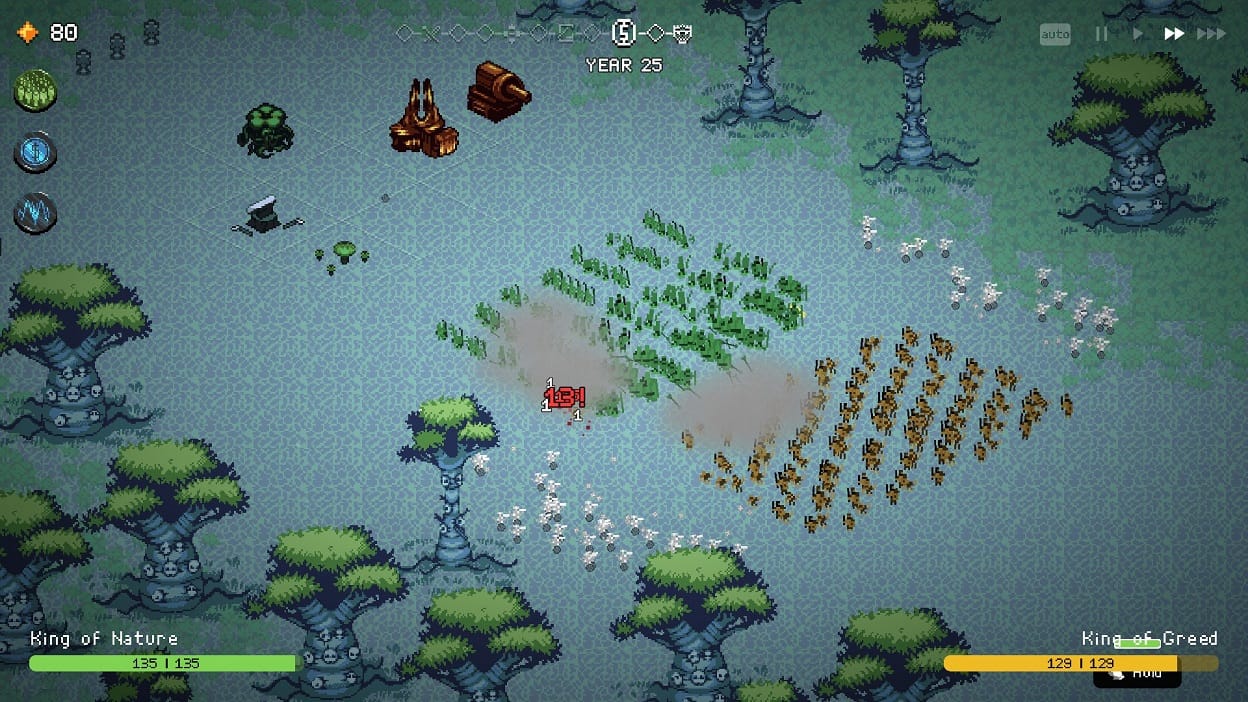
9 Kings
9 Kings is a minimalistic turn-based strategy game. In the role of one of the titular kings, the player must repel attacks from the other eight as well as uprisings from his own people.
The player begins each run with three cards which are some combination of armies, static defenses, support buildings, and one-off upgrades, all drawn from a pool thematically linked to the player's ruler. With each turn, the player has time to play a single card before receiving an attack from one of his rivals. Combat is mainly automatic - the player has some means of directly influencing the fight based on the chosen ruler, but the impact of player attacks tends to be very limited.
After a successful battle, the player has a chance to select a random card from the attacker's card pool. Cards in each pool share a few common mechanics, such as King of Blood cards powering up by sacrificing armies and buildings or King of Greed cards having different effects based on outstanding resources. More powerful builds are usually based on carefully mixing cards from different pools to maximize their effects.
Setting up these combos is essential given the limited space available. The player starts with just nine available tiles, one of which is always occupied by a command building. There are a few opportunities to expand and add new usable tiles, but for the most part, what you see is what you'll have for the entire run. Victory means taking advantage of adjacency bonuses, powering up buildings and armies, and taking opportunities to destroy unneeded buildings to open up avenues for expansion.
Compared to some similar games, 9 Kings is pretty easy to jump into. The core mechanics aren't overly complicated and the cards are self-explanatory. It might take some time to figure out the more powerful combos, but the basic flow of the game is something that even a casual strategy fan will understand. As a result, it's a suitable game for beginners despite the complications caused by the roguelike elements.
Overall, 9 Kings is a solid addition to the trend of minimalistic strategy that should appeal to anyone wanting a shorter strategy experience.
9 Kings is available for PC via Steam. A copy was provided for this review.
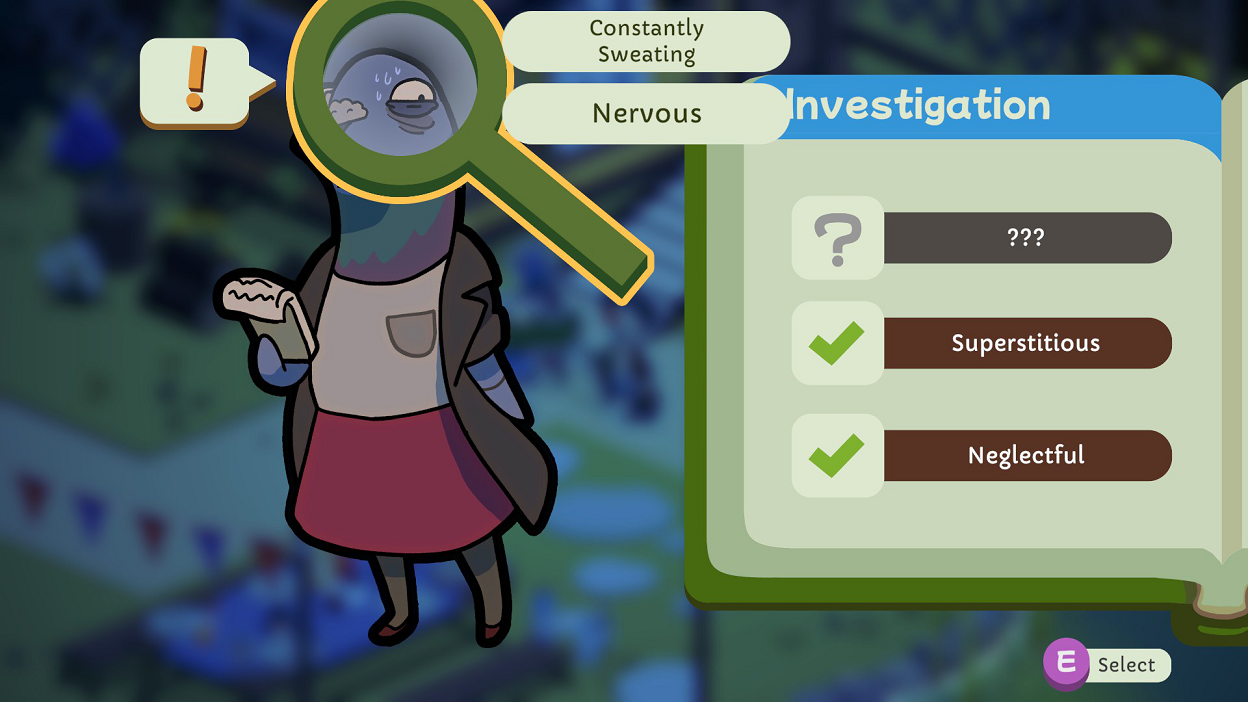
Duck Detective: The Ghost of Glamping
Duck Detective: The Ghost of Glamping is a short adventure game that is a standalone follow-up to last year's Duck Detective game. It features the same gameplay and humor as the first game but with an extra layer of polish.
Eugene McQuacklin is the somewhat-less-than-famous Duck Detective, down and out after a bad divorce and a worse stale bread habit. After his last case failed to make his career, he's been forced to take a roommate - an obsessed fan currently using McQuacklin's delinquency to pressure him into a trip to a famously haunted campsite. But mystery seems to follow the Duck Detective everywhere he goes, and within minutes of arriving, he's on the case of a furniture thief. Is the thief after more than camping chairs? And could the thief be one of those notorious ghosts?
The Ghost of Glamping follows closely in the footsteps of its predecessor, The Secret Salami. The player progresses through the story by solving "deducktions," Mad Libs-style riddles filled in with keywords unlocked through gameplay. Unlocking those keywords in turn requires finding clues by studying suspects and the environment, interrogating suspects, and solving mini-puzzles. There are a few new additions since The Secret Salami, but if you've played that game, you'll know what to do here.
While the core gameplay is the same, there have been design improvements over the first game. The Ghost of Glamping is still a short game - around two hours, roughly the same length as The Secret Salami - but there's more going on, with more locations and more puzzles to solve. That it's about the same length is due to some small but appreciated improvements in the game's layout that make the experience much smoother the second time around. Put simply, you'll see a lot less blundering about in this game than in the first one.
If you liked the first Duck Detective game, then this is a no-brainer. If you're new to the series, this is a good place to jump in as the story stands by itself and is a better experience overall.
Duck Detective: The Ghost of Glamping is available for PC via Steam, on PlayStation consoles, Xbox and Nintendo Switch. A copy was provided for this review.
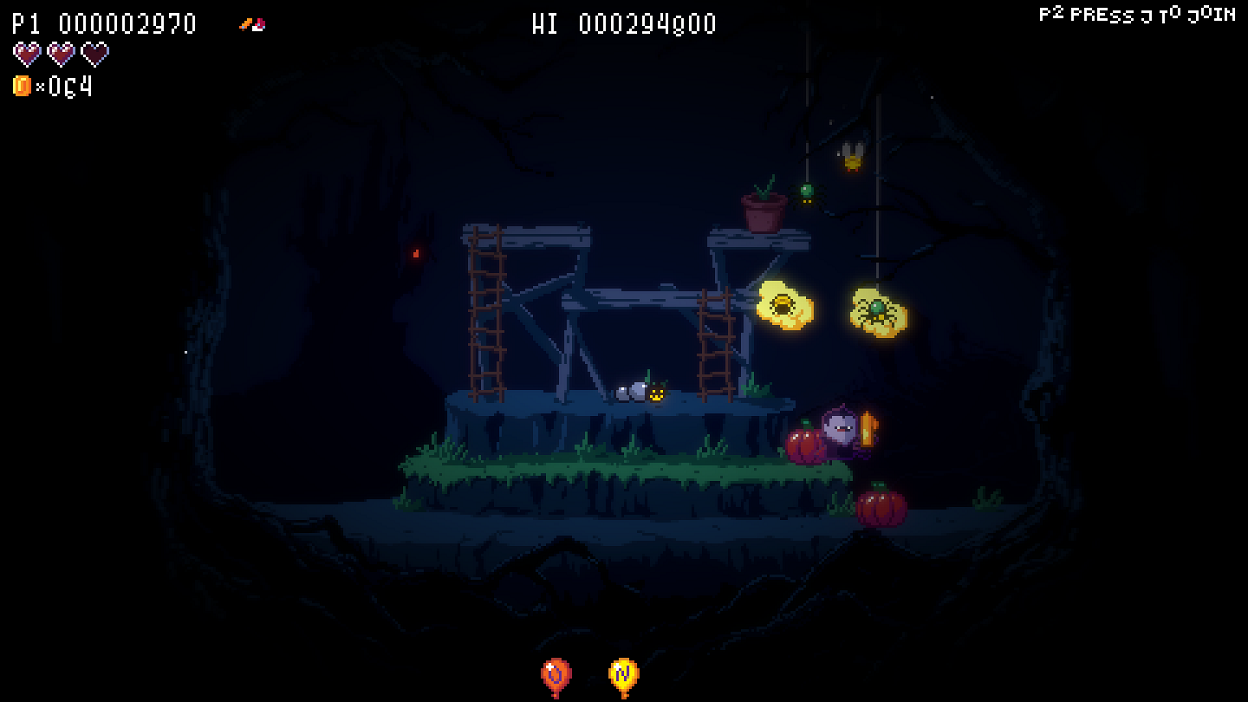
Flora & Fang: Guardians of the Vampire Garden
Flora & Fang is a platformer heavily inspired by Bubble Bobble and other games of that ilk. It's a nostalgic title that's balanced enough to be suitable for a wide variety of players.
The game is divided into a series of stages, each taking a few minutes to complete. The objective is to protect a number of pumpkins from swarms of monstrous insects bent on carrying them away or otherwise destroying them. To fend off the insects, the protagonist comes equipped with a poison sprayer and - eventually - a set of traps.
As with any throwback puzzle platformer, the core gameplay is simple but new elements are added at a steady pace, forcing changes in strategy. Most insects can be contained and destroyed with the spray, but some are only stunned by it and remain a threat. The player can pick up and move the pumpkins, so an effective early strategy is to put them on top of each other to reduce the amount of screen one needs to protect. However, some enemies have gimmicks - such as a special attack that can hit several pumpkins at once - that make this risky. And there are bosses that really confound the ordinary flow of play.
While it's by no means an easy game, Flora & Fang is definitely a smoother ride than some of its inspirations. The difficulty curve is pretty forgiving, and the brevity of the levels makes it a good choice for an inexperienced player, even if some of the later levels will demand more in terms of skill and game sense.
Overall, Flora & Fang is an obvious pick for fans of NES-era puzzle platformers, and also not a bad choice as a palate cleanser after a particularly hardcore title.
Flora & Fang: Guardians of the Vampire Garden is available for PC via Steam. A copy was provided for this review.
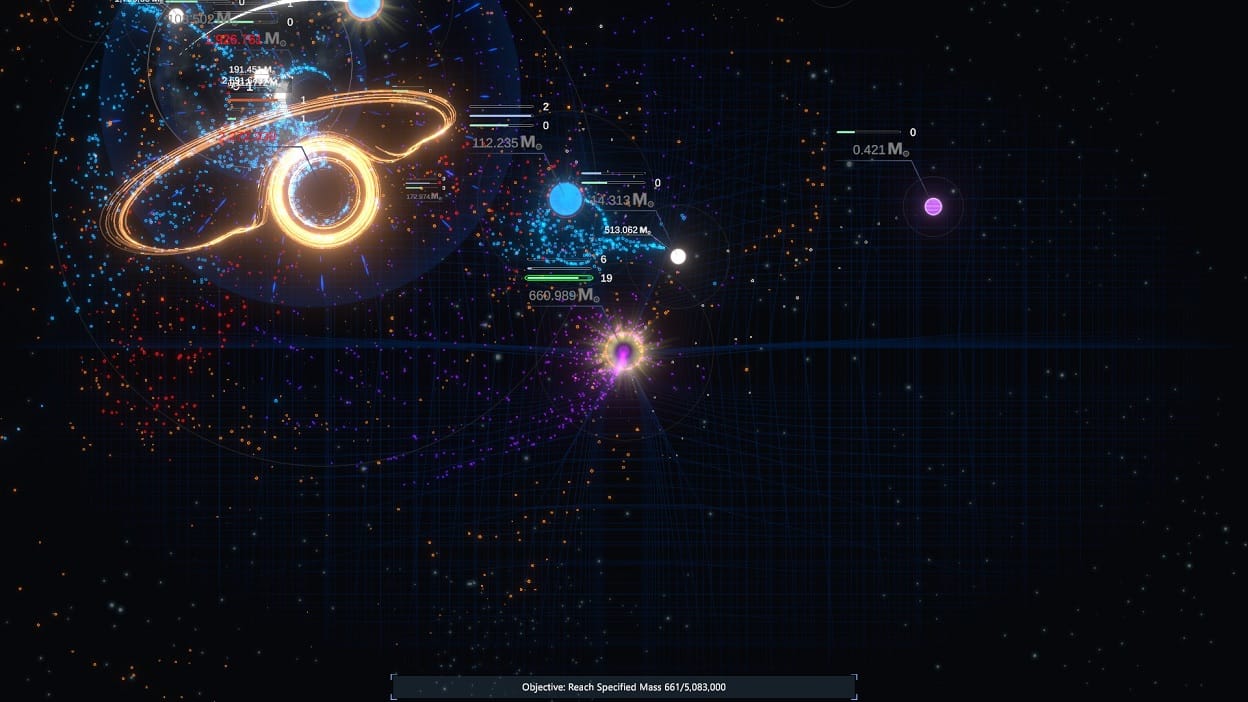
Accretion
Accretion is an action game built around astrophysics and the life cycle of stars. It makes use of well-tested mechanics with a few design twists.
The player takes control of a celestial body with the goal of ascending through the stages of celestial evolution - first acquiring a solid form, then becoming a main sequence star, blue supergiant, and finally a black hole. Achieving this requires absorbing the mass from other, smaller celestial bodies while avoiding collisions and dodging more massive objects. Along the way, the player may encounter other strange space-time phenomena that bend the rules of reality in various ways.
The core gameplay of Accretion is very similar to a class of games in which the player grows by eating smaller things while avoiding larger ones. In the case of Accretion, the player exerts a gravitational lens that steals mass from any other object with a smaller mass than the player. It's a slow process, one that's often interrupted by larger objects that relentlessly pursue the player around open space.
One thing that distinguishes Accretion from similar games is the special abilities that celestial bodies acquire as they grow. Each new phase of existence adds a skill, such as the ability to avoid collisions by phasing into different dimensional space or pulling small planets into orbit. Most of these abilities are not all that intuitive to use, and it can take some time to figure out the timing or the physical rules that define them.
The game's physics is a big selling point. The developers present the game as being derived primarily from Newtonian physics, with the rules defining planetary actions based on actual formulae. This extends to the visuals, which - while simple - do a good job of depicting rare astronomical phenomena. Realistic or not, many players are bound to struggle with some of the quirks in the way that objects interact, especially when there are a lot of them onscreen at once.
Overall, Accretion has some interesting ideas, but the relatively slow gameplay and the idiosyncrasies in the system hold it back.
Accretion is available for PC via Steam. A copy was provided for this review.
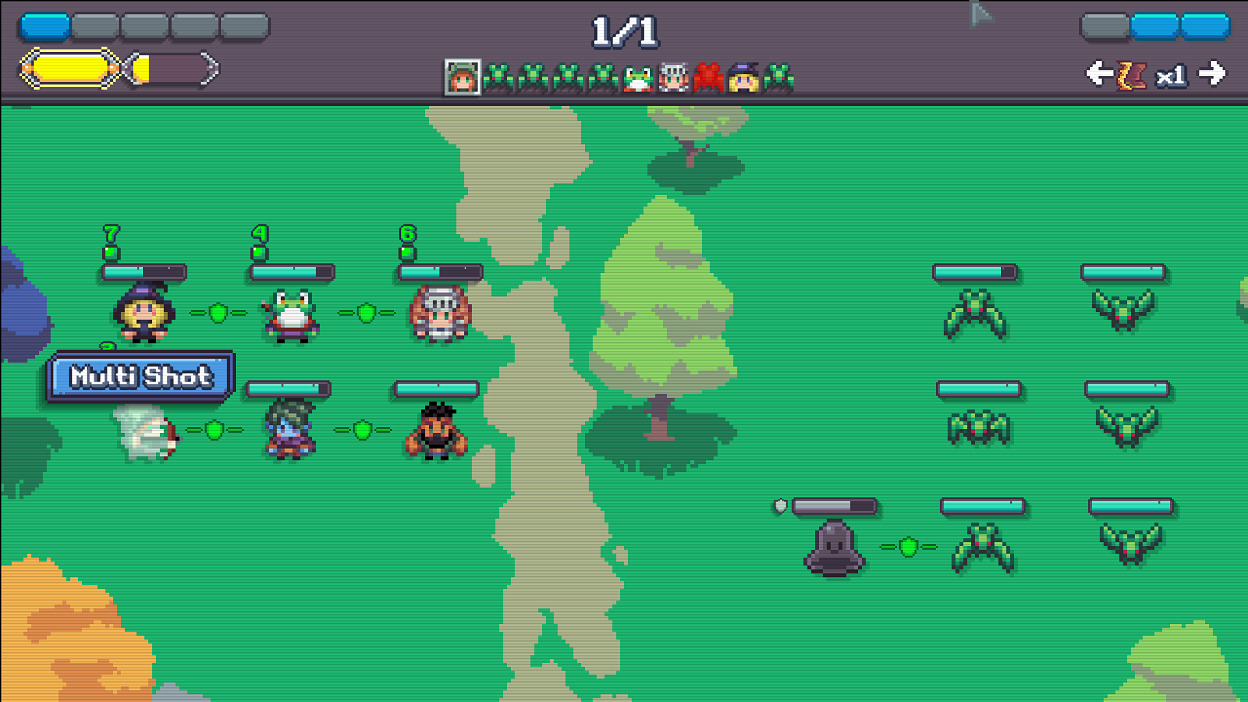
Cauldron
Cauldron is an incremental game built around minigames. This offers a fair amount of variety, with particular appeal for anyone interested in a more easygoing experience.
Cauldron's gameplay centers primarily around a simple RPG. The long-term goal is to push back layers of darkness covering the map, with each square protected by monsters. The combat system is turn-based with staggered turns, as with most modern JRPGs. There's a heavy emphasis on status conditions, making it necessary to stack bad statuses to finish some harder fights.
Clearing darkness will eventually unlock new party members, of which the player can take as many as eight into combat. Each party member is built around a narrow gimmick - such as single-target damage, area effect damage, specific status conditions, or defense - with a special attack and super attack that are themed to it. Each character has a unique set of upgrades with just enough variety to allow for multiple builds but the overall design is very simple, allowing characters to be swapped in and out based on the demands of specific enemy combinations.
Between fights, the player can gather resources - three initially, with two more showing up later in the game. There are minigames to collect these resources, which range from item drops to mining to autoshooters. Gathered resources are used primarily to level up the party, but there's also an upgrade tree for each minigame that helps get higher scores while also boosting the rate at which resources are passively gathered.
Almost the entire game can be idled. The player auto-harvests resources at regular intervals, with the amounts increasing based on performance in the minigames and the proportion of the game cleared. Combat can also be run on full auto. Each character has their own adjustable AI, though the autocombat system is rudimentary and even some relatively easy fights can be too technical for the computer to manage.
Overall, Cauldron definitely has more gameplay depth than your typical incremental game or idler, but don't expect a full RPG experience out of it.
Cauldron is available for PC via Steam. A copy was provided for this review.
That wraps up our look at all the indie games that caught our attention in May. Be sure to come back each month for more of those sweet, sweet indie games you need to know about!
